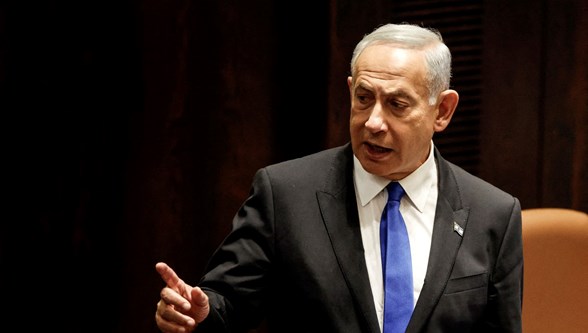Netanyahu spoke at the government’s weekly meeting, Israel’s Channel 12 television reported.
“Israeli political leaders were not informed in advance of the statement made by the military spokesman (Avichai Adlai) and did not coordinate with me. Something like this would never happen,” Netanyahu said.
“I only heard the media statement this morning.”
The Israeli prime minister said an investigation was underway into how such a statement was made without coordination with political authorities.
Netanyahu rejected the allegations, saying, “The news I heard for the first time this morning from the media was unacceptable to me and was not coordinated with me.”
However, Prime Minister Netanyahu insisted there was a short ceasefire on the short axis to allow humanitarian aid to reach Gaza, stressing that this was not as described by the military spokesman.
In his speech, Prime Minister Netanyahu also responded to the June 10 announcement that National Unity Party leader Benny Gantz and former Chief of Staff Gadi Eisenkot would resign from his war cabinet.
Netanyahu claimed some people wanted a change of goals and that the two who submitted their resignations “want the decision to end in defeat and for Hamas to remain as it is,” which he said was unacceptable.
what happened?
“A tactical decision was made to intervene,” Israeli military spokesman Avichai Adlai said in a post on a social media platform.
Adlai later announced that “clashes have not stopped in the southern Gaza Strip and are continuing in Rafah.”
Philadelphia Corridor
Also known as the “Salahaddin Corridor”, it is located on the Gaza-Egyptian border in the buffer zone within the “Camp David” Accords signed between Egypt and Israel in 1979. The corridor is 14.5 km long and several hundred meters wide, stretching from the Mediterranean Sea to the Kerem Abu Salim border gate.
According to the Camp David agreements, the Philadelphia Corridor is part of Palestinian territory, but a certain number of its members (180 armored vehicles and 4,000 soldiers) remain under Israeli military control, while lightly armed Egyptian police are allowed on the other side of the border.
The Philadelphia Corridor remained under Israeli military control until Israel’s withdrawal from the Gaza Strip in August 2005, at which point it was handed over to the Palestinian Authority in the presence of European Union monitors. In September 2005, an agreement was signed between Israel and Egypt regarding the corridor in question, in addition to the security provisions of the 1979 peace agreements.
The agreement stipulates that Egypt will maintain 750 border patrol troops on the Gaza border to handle tasks such as anti-terrorism, anti-smuggling and anti-tunnel operations, and that the Philadelphia Corridor, where Israeli troops will withdraw, will be handed over to the Palestinian Authority.
The Philadelphia Corridor came under the control of the Hamas regime after Hamas won the 2006 Palestinian elections and quickly gained control of Gaza. As a result of the Israeli blockade, the Gaza Corridor has seen the construction of numerous tunnels leading to Egypt.


